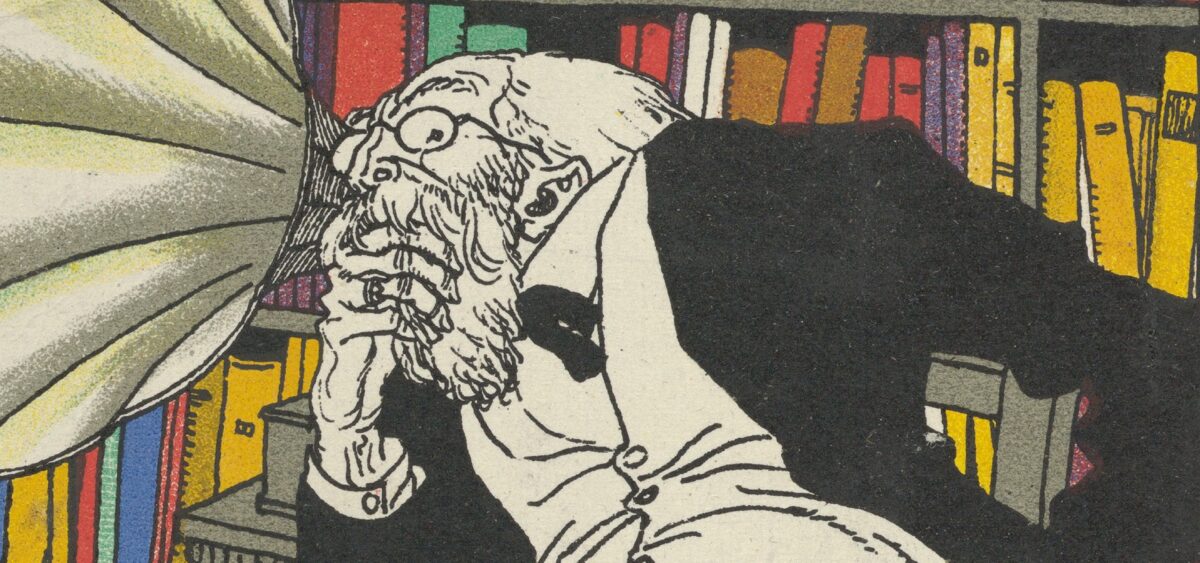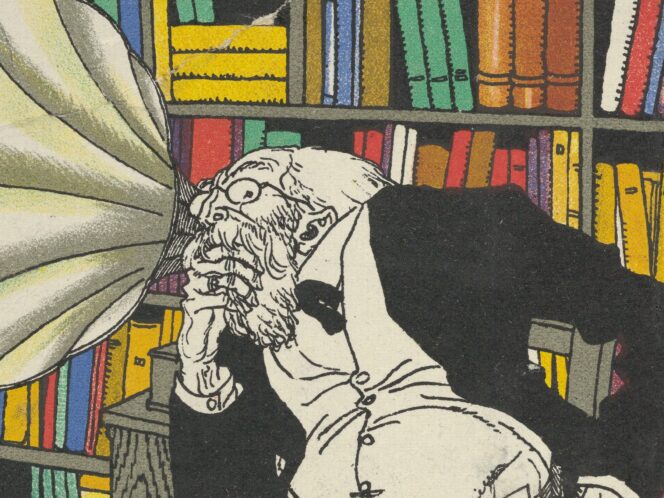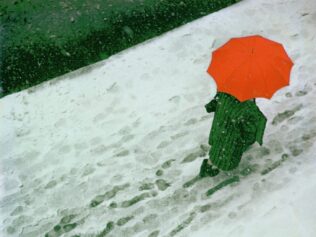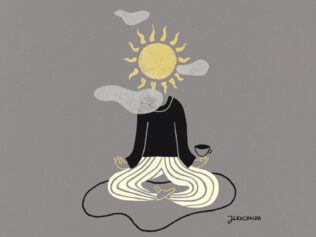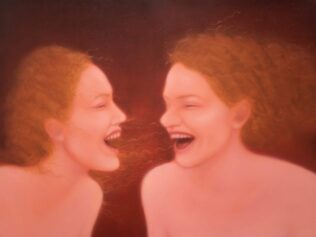
Is physical fitness important for learning foreign languages? How can one pass a university admission test in French without actually knowing the language? How does language affect our understanding of the world? Ireneusz Kania, a translator with competence in more than 20 languages, is interviewed by Łukasz Kaniewski and Tomasz Stawiszyński.
Łukasz Kaniewski and Tomasz Stawiszyński: You are a polyglot who translates [into Polish] religious texts that originate from very distant spiritual traditions. Can you tell us about how you got into such a fascinating field?
Ireneusz Kania: It is difficult for me to pinpoint any specific trigger that first sparked my interest, but I think it was something related to stamps. I started collecting stamps before I could read. This was mostly by ungluing them from envelopes, since in the small town of Wieluń where I was born, no one had even heard of a specialist shop for philatelists. Collecting stamps back then was something completely different from what it is today. Stamp collectors were almost like a secret sect, meeting and swapping stamps. A wonderful subculture, I feel hugely indebted to them. So even when I couldn’t yet read Polish, I could already tell Chinese writing from Tibetan or Thai characters. And it all seemed so fascinating to me. I had four Chinese stamps with strange pictures and two visibly distinct kinds of writing. It was a mystery no one could explain to me. I finally learned what was on these stamps only when I was 21.
Then I realized that what really fascinated me was other spiritual worlds. I wanted to enter those worlds, first via the languages. I thought I would master languages to be able to read the important texts I had heard about here and there. I wanted to read their original versions, because I intuitively felt what I later became certain of, that even very good translations are but a bleak reflection of the aesthetic qualities and cognitive content of the original. Another issue is that such really good translations are really scarce. So I started to learn languages.
You studied by yourself?
I learn everything by myself, even sports techniques. I would not, however, recommend this to others, because you can pick up errors which are difficult to eliminate later on.
Which language was your first?
I learned Italian when I was 16. I was in a sanatorium and incidentally came across The Divine Comedy in a Polish translation. It was an amazing experience that could be likened to an epiphany for me. I said to myself: “How beautiful it must be in the original if it has so much allure in the translation.” And I started learning Italian, which took me 10 months.
In the sanatorium?
Yes. That was an important but also difficult period in my life. I was practically alone there. I had almost no companions my own age, but plenty of time instead. I was uprooted from my home environment when I turned 14. That’s a hugely sensitive time in a child’s life. And I returned as an adult at the age of 18 after many trials and tribulations, which may not have left my personality intact. I simply grew up in a sanatorium. I had a lot of wonderful books to read and facilities to do sport, precisely because it was a sanatorium. Strong and physically fit, I was developing typically for my age. Some people find it surprising that I can stand on my head for 15 minutes, but this is something I could always do.
How about learning a language by yourself? Have you developed your own method?
I had to because – please don’t laugh – the truth is that I have a poor memory.
You even said in one of your previous interviews that you actually have no talent for learning languages.
My language-learning abilities are merely average. Many of my friends are much more talented than me. I am blessed with a different ability: I know how to work very intensely for a long time, without feeling exhausted. When my secondary school leaving exams were approaching and we were supposed to decide on a university, everyone thought I would study art because I could draw and I enjoyed it. But I also knew Italian and a bit of Spanish, as well as Latin, which was obligatory in my secondary school, so I came up with the idea of majoring in Romance studies. Then, about four months before enrolling to university, I learned that there was an obligatory admission test in French. I didn’t speak French, so I got quite terrified.
One day my father asks me what I am planning to go into. I tell him I was thinking of Romance studies, but learned you need to speak French. So my dad says: “Well, that’s out of the question, you have to choose something else.” I guess I just wanted to have my way because I had always been rebellious, so I replied: “No, I will just learn French.” Mind you, my school leaving exams were then pending and I was really behind on a lot of subjects, because the teaching standards at the sanatorium were pretty lax.
So what did you do?
I started to study French by myself. Five hours every day, for five months. Someone with a different mental and physical disposition might have endured it for three weeks at best. But not me. I had enough stamina, also in the basic physical sense, which I owed to sport. I just devoured knowledge with great pleasure. It was the year 1959 and a reprint of a very good dictionary from before World War II came out. I also had a French coursebook, in which there was not a single Polish word and which lacked a number of initial and final pages. Most importantly though, I had the French novel The Red and the Black. I started to read that novel. I simply read and I looked up every word I didn’t know. When I found the meaning of an unknown word, I went on with my reading. Since my memory is poor, I had to reach for the dictionary several times before I actually remembered a word. But after checking the same entry for the fifteenth time, I finally remembered it. Language phenomena are systemically interlinked and the best way to learn a language is to immerse oneself in a real context.
Didn’t you write those newly-learned words down anywhere?
I wrote them down on little pieces of paper, which I subsequently set aside. I never looked at them again. The next time that I encountered the same word, I looked it up in the dictionary again. Working in this way, I finished reading the 500-page novel at the eleventh hour, which is to say, by the end of June. When I looked at those little pieces of paper later, I realized how the learning process proceeded. On the first few pages, I came across about 40 unknown words or structures. After reading 50 pages there were another 15 or perhaps 20 such forms. Language is organized such that the most useful words are repeated the most often. When I was finishing, there were one or two unknown words every few pages. I remembered most of them, but I was still completely ignorant about pronunciation. All I knew was how to read the consonants spelt as ‘ch’ and ‘j’. Apart from that, the phonetics of French were uncharted territory for me. In my town, there was nobody, at least among people I knew, who spoke French and whom I could consult on the pronunciation.
How did you overcome that?
The admission test was in fact a long dictation – a text from French literature, read to us by Dr Drzewicka, who later became a renowned Professor of French. When it was read for the first time, I hardly understood anything. So I turned to other examinees who’d had more formal instruction in French than me and asked them about words I couldn’t identify. Fortunately, I have a very good sense of hearing. Dr Drzewicka read the text out three times to us, because it was long and difficult. The third time I understood everything. I handed the text in and it turned out to be one of the best. I made only three or four spelling errors, which is a very decent result, considering French orthography.
But then there was an oral exam. So Dr Drzewicka starts speaking French to me and I am just standing there, not understanding a word. She looks at me, then at my written exam and says: “But your dictation was very good?” Again, she starts speaking French to me, and again I’m speechless. Then she asks me in Polish how I ended up there. I tell her my story, mentioning that I spoke Italian. So she switches to Italian and this is how I passed my exam.
What language are you learning now?
Well, I don’t learn new languages any more.
What is the relationship between writing and speaking in a language?
That depends on the language. At university, all classes were taught in French, so I learned to speak after about a month. After three months, I became very fluent. Several years ago, I decided to learn Modern Greek. I knew Classical Greek from the courses I had taken as a student, but not its modern variety. When I discovered Konstantinos Kavafis, I wanted to read him in the original. When I started learning Modern Greek, I read tons of books in the language. For a person familiar with Classical Greek, Modern Greek is easy. So I read a lot of books in Greek, and also learned to speak because my wife and I spent almost every holiday in Greece. Greeks compliment me on my pronunciation and grammar, and some even ask: “Are you Greek?” “No” “Where are you from, then?” “Poland” “So your wife must be Greek?” (they know there are many Greeks in Poland). “No, I don’t have any family connections.” At this point they open their mouth in disbelief that someone put effort into learning such an insignificant language as theirs. “You’d be better off learning English,” they say. Of course I speak English too because English is indispensable nowadays. I can’t say I’m fond of English, but I definitely love Modern Greek.
Why are you not fond of English?
Well, I don’t really know what to say… I wouldn’t like to hurt those who love English, and I know plenty such people. For me, English is too simple, or even simplistic. Not rich enough.
It has a lot of words.
Yes, a lot of words. But very limited derivational potential. In inflectional languages, like Polish, Modern Greek or German, this potential is huge. I like complicated languages like these. The only grammar that is simpler than English is Chinese. And I really like complicated grammars, such as Sanskrit, which is enormously complicated. Classical Greek or Latin are pretty involved too.
How many languages do you know now?
It depends what level of proficiency we are talking about. I can communicate fluently in more or less 10 languages, but I can understand written texts – which was always of primary importance for me – in 20, or perhaps even 22, 23 languages. But these numbers are fluctuating rather than stable. To give you an example, I’m not sure I could say now that I know Old Icelandic. I mastered it when I was a student and I read sagas, but today when I flip through the pages of a saga, I seem to understand only half of it. Of course, I would be able to reactivate my Old Icelandic if I had to, because it is latent in my mind. It is the same with speaking. When I was in Portugal on a three-month stay in 1981, I could speak Portuguese, and you should know that I adore this beautiful language. It isn’t easy, but I could communicate quite efficiently. Today, that would still be possible, but much more effortful. The thing is that I can’t recall having more than two conversations in Portuguese since that time.
How many languages coexist in your mind? How does it feel to accommodate 20 linguistic systems in your brain? How do you access them or switch from one to another?
It’s a great pleasure. I switch between languages very smoothly and immediately. I just take a plug out of one socket and put it into another.
You don’t mix up words from various languages?
Recently I do, to some extent. But in the past I didn’t have any problems of this sort. I remember an international academic camp in which I participated as a student. I was sitting in an international group around a table, I carried out a conversation in, I think, five different languages, switching from one to another without any effort. Today, however, I notice that when I’m speaking, say, Romanian, a word from another language, such as Italian or Spanish, is intruding into the conversation. It bothers me because I can’t free myself from such an intrusion. All this is due to a lack of everyday contact with the language in question. I used to write better French than Polish, because we wrote a lot of essays at university. My Spanish, Italian and Romanian were so good that I used to pass for a native speaker of these languages. But that was a long time ago.
How did you learn grammar? Do you learn the rules or try to extract them from the context?
Always from the context. Whenever I encountered a grammatical form, I would look it up in a grammar course book. And only then did I learn the whole paradigm.
Did you do drills to memorize verb forms?
I never learned by heart because I knew it didn’t make any sense – I would have forgotten everything the next day. My memory absorbs information that I merely come across faster than things I specifically intend to memorize. And I’m completely deprived of photographic memory. I learned to read in Chinese and I even read a few books 25 years ago or so. Then I didn’t reach for any Chinese texts for years, and when I recently looked at these books, the characters appeared familiar, but I had no idea what they stood for. I simply forgot, precisely because I have no visual memory. What I remember is a structure, the essential nature of a phenomenon and how it can be categorized. When I grasp the essence of this kind, I very quickly memorize all details that flesh out the structure. To illustrate, when I capture the structure of a building, all its architectural details fit into this structure very easily in my mental picture of that building. That’s the kind of memory and intelligence I have. I’m not saying it is superior or inferior to other kinds, but this is what I’m equipped with. There are advantages, but one obvious disadvantage is that when you have to learn something by heart, I’m no good at it. That’s why history at school was my weak point – remembering all the dates and names was a challenge. But if I understood the heart of a matter, I didn’t encounter any major problems with learning.
How is language related to reality for you? Do you experience the world differently depending on the language you use?
When I switch to another language, something changes… It is a very subtle difference that is difficult to verbalize, but I can say I perceive some portion of reality in a different way. And then when I switch to yet another language, my perception changes again. Especially when the languages are dissimilar. Well, when I switch from Italian to Romanian, the differences are so nuanced that I barely notice them. But when I’m reading Chinese or Sanskrit texts, I travel a long distance and I can see a significant difference in the outlook on the world. This may even concern human activities. When I adopt a Tibetan perspective, I perceive the world through Tibetan syntax. Unlike European languages, it is hinged upon the verb, which constitutes a foundation on which the perception of the world resides. All the other elements are incidental to this foundation, as if they were of secondary importance. The agent performing the action is in the background. The syntax of European languages imposes a different perception of reality. I am the subject, there are things around me, and the relationship between me and these things is that of interaction.
Are you suggesting that seeing the world as a process, which is characteristic of Buddhism, is encoded in the language?
Yes. It is encoded in the fundamental structures of a language, as was beautifully described by Benjamin Lee Whorf, who studied Native American languages. Through the prism of these languages, the world does not appear as a collection of still, motionless objects, which exist independently of us and which are objectively unrelated to each other, with humans establishing whatever connections there may be. This is our world, full of static objects in which we initiate all interactions, as expressed by our transitive verbs, e.g. “I am chopping the wood”. ‘I’ stands for the agent doing the action and ‘the wood’ is a passive recipient, or patiens, to use the Latin nomenclature. There is nothing like that in the languages of Native Americans. There the world is in continuous motion; it is a dynamic structure perceived as a process. When a Native American person notices a building, he or she perceives a process – something is happening. And all this is due to the language structure, which imposes this kind of perception. I know about it from my own experience, and I can assure you that language structures affect how we perceive and understand the world.
Is your dislike of English rooted in your attitude towards the Anglo-Saxon world?
Yes. It really sounds awful to my ear that almost every sentence in English starts with the pronoun ‘I’. This prominent feature of English, represented to a much greater extent than in any other language, is something hideous to me.
Some Buddhists even practice not using the pronoun ‘I’ at all.
Yes, they do. But why is it easy for Buddhists? Because in the languages spoken by them this pronoun is hardly used anyway. Sanskrit is an Indo-European language structurally similar to Polish, but it practically does not use the pronoun ‘I’ either. If you want to talk about an action performed by a subject, instead of using a pronoun, you apply an ergative construction. Instead of saying “he chopped the wood”, you say something like “the wood was chopped by means of him”. Or instead of “I made this”, you say “this was made by means of me”. So the focus is on what was done, and not on the doer of the action. The doer, the ‘I’, is a mere accident; an add-on. In Sanskrit there are numerous constructions of this kind. They also occur in Tibetan, in which the pronoun ‘I’ is typically used in the instrumental case, and hardly ever in the nominative case. You won’t say “I wrote a letter”, but something like “a letter was written by means of me”. The activity and its effect are more important than the agent. This kind of linguistic phenomenon shapes a specific view of the world. Interestingly, the ergative construction is also frequent in Russian.
How is life in the present-day world for you? You don’t have a computer. Do you use a mobile phone?
A first-generation Nokia. I was offered newer types, but I don’t want one. I don’t need a computer either. Some of my friends do not keep dictionaries at home, saying that the internet will do. Someone was looking for a Tibetan word once, but didn’t find it in the internet version of the dictionary, whereas I have a whole bookshelf of Tibetan dictionaries, where I found this word easily. So you won’t find everything on the internet. All the literature that I need is also on my shelves. My colleagues say that it is easier to correct errors on a computer. But I prefer a typewriter. Sometimes I even hand-write some texts first. When I’m translating from languages that are close to us, I will have read a book three times already, so there are practically no corrections to be made, except perhaps something really small.
Please tell us about your average day.
I start the morning reading from Buddhist texts. And then I read books that I didn’t have time for throughout my life. Nowadays I work less than I used to. I still translate from time to time, but not as much as I did, so I can finally read for pleasure. I also find time to do sport. When I was still in the sanatorium, I started fencing and then I took up athletics and bodybuilding. Even though I was a promising bodybuilder, I gave up the discipline when I encountered Wisława Szymborska’s poem Bodybuilders’ Contest. I read the poem, looked at myself and started to laugh. I chose weightlifting instead and joined a club that I represented for the next 20 years. The last time I participated in a contest was in 1980, when I was 40. I won third place in the City of Kraków contest. I keep training, last month a friend of mine and I finished the indoor weightlifting season. We practise in autumn and winter. In summer we go cycling and, if possible, swimming. I love swimming, but in Poland it is rather difficult. One of the reasons we go to Greece is to take delight in swimming.
So my lifestyle includes a lot of reading, sport and watching the world. This is what I’ve always liked and it is my dharma: staring at the world. An attempt to grasp the world mentally.
Your perspective is quite distinctive because you know religious texts originating from many different and often distant traditions. And today’s world sees ideas based on the positivist philosophy hoping that science will solve all problems and lead us to a happy future. Many people treat old spiritual traditions as outdated and inefficient, conferring all their hopes on science. What is your opinion on that?
I feel very sorry for such people. The idea that old beliefs should be dispensed with and that science will provide questions to all answers is simply naïve. I can’t imagine an adult person who would subscribe to this idea.
We know a few.
I might know a few too. And I genuinely feel sorry for them. They should listen more carefully to what great scientists say. An outstanding scientist is fully aware of the limitations science is subject to. He or she knows that we will never be able to state that all problems have been solved and everything has been explained. That’s just not possible.
Such opinions do not seem infrequent.
True. At the same time we can observe a downfall of religion. Religion is fading as an authority and as a source of metaphysical intuition. Religions are dying. All of them, everywhere. Religion has ceased to be of vital importance to people, as it used to be before.
Why is that happening? Because the account of reality offered by religion has proved to be insufficient or inadequate?
To some extent yes, but that’s not the only reason. What matters here is awareness stemming from a very long period of history. People used to hope that evil would disappear from the world. They thought it was a transient state. Today we no longer hope this, because we can draw conclusions from texts written over the period of a few thousand years. We know that the world has always been what it is, only that today it is more difficult because there is more of everything.
We also have online information technologies thanks to which information travels instantaneously. We have an online world.
We have the whole world. We can see that there is more and more suffering and that there will be even more because there are more of us. As simple as that.
Couldn’t this be an argument in favour of the Buddhist perspective and dharma?
I personally believe – I’m not sure if I’m supposed to talk about this – that what could be cautiously called the truth about reality was attained to the greatest extent by the followers of the Buddhist dharma. Their description of the world, including ontological intuitions, proves to be right all the time. The fundamental recognition of the world as being processual in nature is also Buddhist. Today we know that this is the way things are, also according to science. I’m not granting to science the status of an absolute tool for explaining the world, but we don’t have a better one at the moment.
Besides, Buddhism offers the most profound knowledge on human nature, and the nature and psyche of all living things. A large part of Buddhist doctrine, which gives rise to Buddhist ethics, follows from fundamental psychological intuitions.
Which kind of Buddhism do you feel the closest to?
Definitely the oldest, which is known as the Pali Canon. I’ve been involved in it for the last 15 years. I read a lot of texts in Sanskrit and in Pali, and I still discover new things in them. They have come the closest. I am not saying that other religions are misleading or false, because this is not what I mean. All I am talking about is how close they got. The Buddhists have come the closest.
Parts of this interview have been edited and condensed for clarity and brevity.



